JVC AV-32950 User Manual
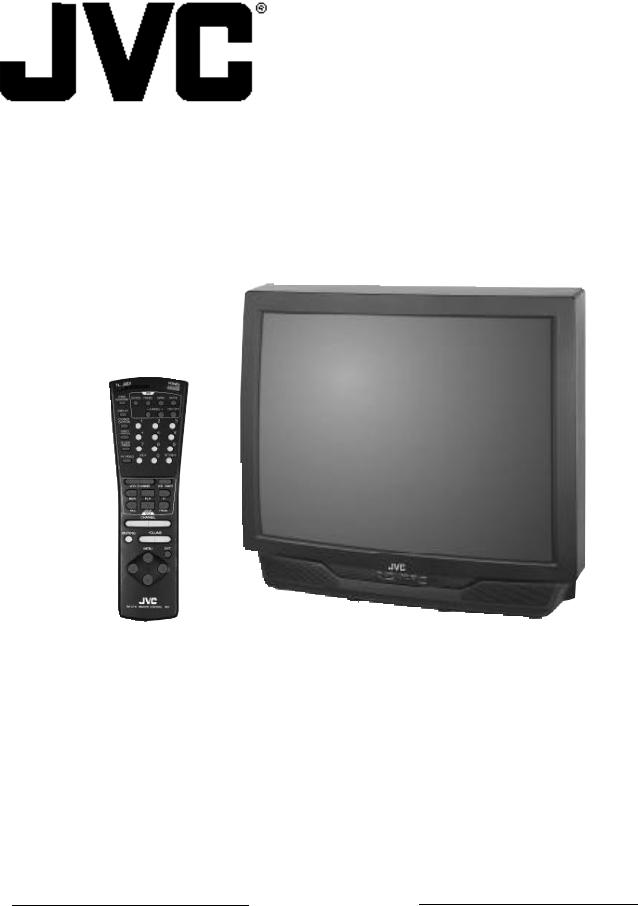
|
|
|
For Models: |
|
|
|
|
AV-36950 |
|
Color Television |
AV-35955 |
|||
AV-32950 |
||||
User’s Guide |
||||
AV-27950 |
||||
|
|
|
||
|
|
|
|
|
|
|
|
|
|
Illustration of AV-32950 and RM-C755
NOTE TO THE CUSTOMER:
In the spaces below, enter the model and serial number
for your television (located on the rear of the television cabinet). Staple your sales receipt or invoice to the inside cover of this guide. Keep this user’s guide in a convenient place for future reference. Keep the carton and original packaging for future use.
Model Number |
Serial Number |

CAUTION
CAUTION:To reduce the risk of electric shock. do not remove cover (or back).
No user serviceable parts inside.
Refer servicing to qualified service personnel.
The lightning flash with arrowhead symbol, within an equilateral triangle is intended to alert the user to the presence of uninsulated “dangerous voltage” within the product’s enclosure that may be of sufficient magnitude to constitute a risk of electric shock to persons.
The exclamation point within an equilateral triangle is intended to alert the user to the presence of important operating and maintenance (servicing) instructions in the literature accompanying the appliance.
IMPORTANT SAFEGUARDS
CAUTION:
Please read and retain for your safety.
Electrical energy can perform many useful functions. This TV set has been engineered and manufactured to assure your personal safety. But improper use can result in potential electrical shock or fire hazards. In order not to defeat the safeguards incorporated in this TV set, observe the following basic rules for its installation, use and servicing.
And also follow all warnings and instructions marked on your TV set.
INSTALLATION
1Your TV set is equipped with a polarized AC line plug (one blade of the plug is wider than the other).
(POLARIZED-TYPE)
This safety feature allows the plug to fit into the power outlet only one way. Should you be unable to insert the plug fully into the outlet, try reversing the plug.
Should it still fail to fit, contact your electrician.
2Operate the TV set only from a power source as indicated on the TV set or refer to the operating instructions for this information. If you are not sure of the type of power supply to your home, consult your TV set dealer or local power company. For battery operation, refer to the operating instructions.
3Overloaded AC outlets and extension cords are dangerous, and so are frayed power cords and broken plugs. They may result in a shock or fire hazard. Call your service technician for replacement.
4Do not allow anything to rest on or roll over the power cord, and do not place the TV set where power cord is subject to traffic or abuse. This may result in a shock or fire hazard.
5Do not use this TV set near water — for example, near a bathtub, washbowl, kitchen sink, or laundry tub, in a wet basement, or near swimming pool, etc.
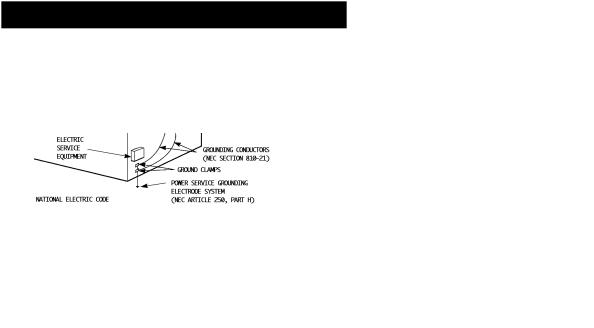
6If an outside antenna is connected to the TV set, be sure the antenna system is grounded so as to provide some protection against voltage surges and built-up static charges. Section 810 of the National Electrical Code provides information with respect to proper grounding of the mast and supporting structure, grounding of the lead-in wire to an antenna discharge unit, size of grounding conductors, location of antenna discharge unit, connection requirements for the grounding electrode.
7An outside antenna system should not be located in the vicinity of overhead power lines or other electric light or power circuits, or where it can fall into such power lines or circuits. When installing an outside antenna system, extreme care should be taken to keep from touching such power lines or circuits as contact with them might be fatal.
13For added protection of the TV set during a lightning storm or when the TV set is to be left unattended for an extended period of time, unplug it from the wall outlet and disconnect the antenna. This will prevent damage to product due to lightning storms or power line surges.
14A TV set and cart combination should be moved with care. Quick stops, excessive force, and uneven surfaces may cause the TV set and cart combination to overturn.
8TV sets are provided with ventilation openings in the cabinet to allow heat generated during operation to be released. Therefore:
—Never block the bottom ventilation slots of a portable TV set by placing it on a bed, sofa, rug, etc.
—Never place a TV set in a “built-in” enclosure unless proper ventilation is provided.
—Never cover the openings with a cloth or other material.
—Never place the TV set near or over a radiator or heat register.
9To avoid personal injury:
—Do not place a TV set on a sloping shelf unless properly secured.
—Use only a cart or stand recommended by the TV set manufacturer.
—Do not try to roll a cart with small casters across thresholds or deep pile carpets.
—Wall or shelf mounting should follow the manufacturer’s instructions, and should use a mounting kit approved by the manufacturer.
USE
10Caution children about dropping or pushing objects into the TV set through cabinet openings. Some internal parts carry hazardous voltages and contact can result in a fire or electrical shock.
11Unplug the TV set from the wall outlet before cleaning. Do not use liquid or an aerosol cleaner.
12Never add accessories to a TV set that has not been designed for this purpose. Such additions may result in a hazard.
SERVICE
15Unplug this TV set from the wall outlet and refer servicing to qualified service personnel under the following conditions:
A.When the power cord or plug is damaged or frayed.
B.If liquid has been spilled into the TV set.
C.If the TV set has been exposed to rain or water.
D.If the TV set does not operate normally by following the operating instructions. Adjust only those controls that are covered in the operating instructions as improper adjustment of other controls may result in damage and will often require extensive work by a qualified technician to restore the TV set to normal operation.
E.If the TV set has been dropped or damaged in any way.
F.When the TV set exhibits a distinct change in performance — this indicates a need for service.
16Do not attempt to service this TV set yourself as opening or removing covers may expose you to dangerous voltage or other hazards. Refer all servicing to qualified service personnel.
17When replacement parts are required, have the service technician verify in writing that the replacement parts he uses have the same safety characteristics as the original parts. Use of manufacturer’s specified replacement parts can prevent fire, shock, or other hazards.
18Upon completion of any service or repairs to this TV set, please ask the service technician to perform the safety check described in the manufacturer’s service literature.
19When a TV set reaches the end of its useful life, improper disposal could result in a picture tube implosion. Ask a qualified service technician to dispose of the TV set.
20Note to CATV system installer.
This reminder is provided to call the CATV system installer’s attention to Article 820-40 of the NEC that provides guidelines for proper grounding and, in particular, specifies that the cable ground shall be connected to the grounding system of the building, as close to the point of cable entry as practical.

WELCOME!
Congratulations on your new television purchase! We thank you for choosing JVC.
We know you are anxious to start watching your new television, but before you operate it, please read this guide and then keep it handy for future reference. After all, you just bought a great TV with a lot of terrific features, you should know what each feature is and how to use it properly!
Please note that the illustrations, diagrams, and menu pictures are not exact replicas of the actual television features. They are for reference only.
Again, congratulations and thank you for choosing JVC! Enjoy!
TABLE OF CONTENTS
CONNECTIONS
Connections Checklist . . . . . . . . . . . . . . . . 5
Front & Rear Panel Diagrams . . . . . . . . . . . . 5
Cable & VCR Connections . . . . . . . . . . . . . . 6
Audio/Video Connections — Stereo . . . . . . . . . 7
Connecting to a Camcorder . . . . . . . . . . . . . 8
Connecting to an External Amplifier . . . . . . . . . 8
Connecting to JVC AV Compu Link
Capable Components . . . . . . . . . . . . . . . 9
GETTING STARTED
Remote Control . . . . . . . . . . . . . . . . . . . 10 Power . . . . . . . . . . . . . . . . . . . . . . . . . 11 Adjusting Volume . . . . . . . . . . . . . . . . . . 11 Changing Channels . . . . . . . . . . . . . . . . . 11 Setting the CATV and VCR codes . . . . . . . . . 12
MENU FUNCTIONS
Symbols Used in this Guide . . . . . . . . . . . . 14 Onscreen Menus. . . . . . . . . . . . . . . . . . . 14 Plug In Menu . . . . . . . . . . . . . . . . . . . . . 15
Language
Auto Tuner Setup
Set Clock . . . . . . . . . . . . . . . . . . 16
Finish
Initial Setup . . . . . . . . . . . . . . . . . . . . . 17
Channel Summary Channel Guard-Lock
Picture Adjust . . . . . . . . . . . . . . . . . . . . 18
Tint
Color
Picture
Bright
Detail
Notch
Noise Muting Set Video Status
Sound Adjust . . . . . . . . . . . . . . . . . . . . . 19
Bass
Treble
Balance
MTS (Multi-channel Stereo Sound)
Some Sound Advice
Clock/Timers . . . . . . . . . . . . . . . . . . . . . 20
On/Off Timer
Set Lock Code
Initial Setup . . . . . . . . . . . . . . . . . . . . . . 21
TV Speaker
Audio Out
Closed Caption
BUTTON FUNCTIONS
Display . . . . . . . . . . . . . . . . . . . . . . . . 22 Closed Caption . . . . . . . . . . . . . . . . . . . . 22 Video Status . . . . . . . . . . . . . . . . . . . . . 22 Sleep Timer . . . . . . . . . . . . . . . . . . . . . . 22 Hyper Surround . . . . . . . . . . . . . . . . . . . 23 TV/Video . . . . . . . . . . . . . . . . . . . . . . . 23 100+ . . . . . . . . . . . . . . . . . . . . . . . . . . 23 VCR Buttons . . . . . . . . . . . . . . . . . . . . . 23 Menu Buttons . . . . . . . . . . . . . . . . . . . . . 23 Muting . . . . . . . . . . . . . . . . . . . . . . . . . 23 Return+. . . . . . . . . . . . . . . . . . . . . . . 23 Number Buttons (10 Key Pad) . . . . . . . . . . . 23 PIP (Picture In Picture) . . . . . . . . . . . . . . . . 24 Channel -/+ for PIP . . . . . . . . . . . . . . . . . . 24 Source . . . . . . . . . . . . . . . . . . . . . . . . 24 Freeze . . . . . . . . . . . . . . . . . . . . . . . . . 24 Swap . . . . . . . . . . . . . . . . . . . . . . . . . 24 Move . . . . . . . . . . . . . . . . . . . . . . . . . 24
APPENDICES
Troubleshooting . . . . . . . . . . . . . . . . . . . 25
Limited Warranty . . . . . . . . . . . . . . . . . . . 26
Authorized Service Centers . . . . . . . . . . . . . 27
Specifications . . . . . . . . . . . . . . . . . . . . 28
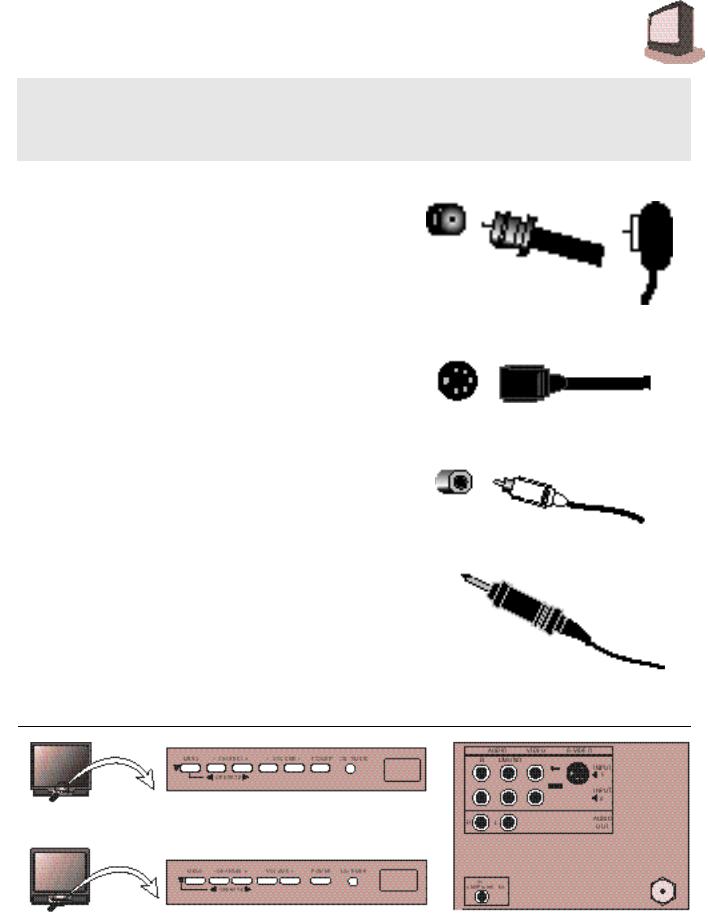
C O N N E C T I O N S 5
The Connections Checklist — Read Me First! section of this guide is a list of ideas to keep in mind when you set out to perform your connections. It is designed to help us not-so-technically-advanced individuals. If you read this section, and can’t identify the plugs, connectors, and components you have, do not be afraid to seek help.
1)Refer to the connection instructions in the user’s guide for each component you plan to connect.
They will provide more detailed information about their products, and they will tell you what plugs and cables are required.
2)Most A/V input jacks and plugs are color coded:
•Yellow plugs are Video connections
•Red plugs are for Right Audio connections
•White plugs are Left Audio (Mono) connections
3)Perform one hookup at a time.
If you have many accessories to connect, make sure each connection is correct by checking to see that it works properly before attempting the next connection. (For example, always start with the RF or Cable connections, make sure it works, then move on to video or VCR connections.)
4)Unplug the power cord between each connection.
5)Each jack on the back of the TV is labeled. If you read these instructions and still do not fully understand the connections process, seek assistance.
6)The AV Compu Link Cable is supplied with the JVC device which you want to connect. If you do not have one, but you do have a JVC Compu Link capable VCR or HiFi, contact your local JVC dealer.
RF Connectors
S-Video Plug
A/V Input Plug
AV Compu Link Cable
FRONT & REAR PANEL DIAGRAMS
FRONT PANEL DIAGRAM
AV-32950 • AV-27950
|
|
REAR PANEL DIAGRAM |
FRONT PANEL DIAGRAM |
||
AV-36950 • AV-35955 |
|
Common to all models in this book. |
|
|
|
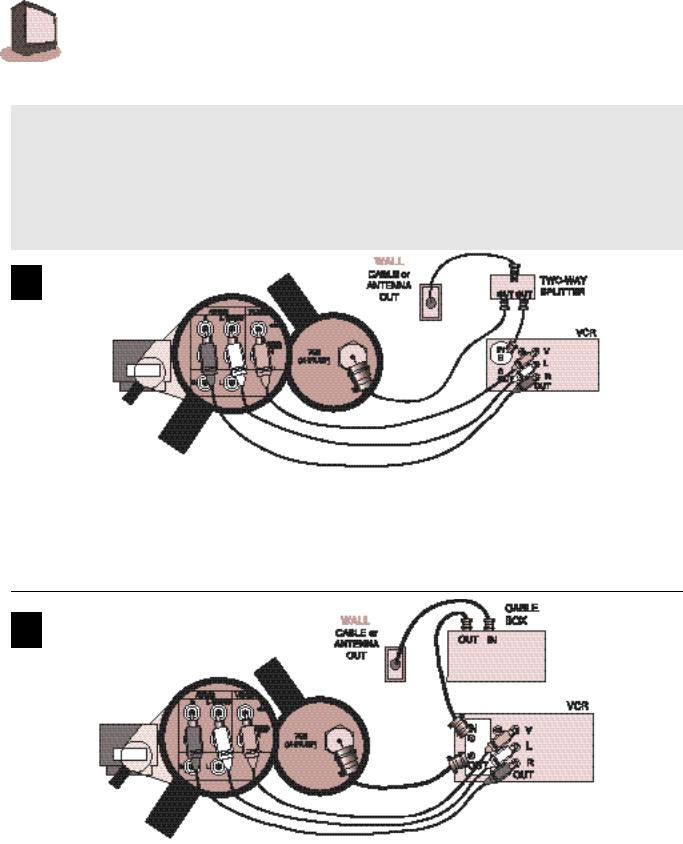
6 C O N N E C T I O N S
CABLE & VCR CONNECTIONS
There are two basic types of antenna or cable hookups. If you have an antenna, or have a cable TV system that does not require you to use a cable box to tune channels, use Diagram #1. If you have a cable system that requires you to use a cable box to access all channels, use Diagram #2. If you have a cable system that requires you to use a cable box to access certain premium channels, but not regular basic channels, use Diagram # 3.
NOTE: To get stereo sound from a hi-fi stereo VCR, you must connect it to the TV with Audio/Video cables. Also, to get the best picture quality from any VCR use Audio/Video cables. (Use them! You’ll be glad you did.)
#1
1)Connect cable or antenna RF wire out from the wall, in to the splitter RF input.
2)Connect RF wire Out from the splitter RF output, in to the VCR RF input.
3)Connect RF wire Out from the splitter RF output, in to the TV VHF/UHF input.
4)Connect yellow video cable out from the VCR Video output, in to the TV Video input jack.
5)Connect white audio cable out from the VCR Left Audio output, in to the TV Left Audio input jack.
6)Connect red audio cable out from the VCR Right Audio output, in to the TV Right Audio input jack.
If your VCR is mono it has only one audio out jack, connect it to TV L/Mono input.
#2
1)Connect the cable RF wire out from the wall, in to the cable box input.
2)Connect RF wire Out from the cable box RF output, in to the VCR RF input.
3)Connect RF wire Out from the VCR RF output, in to the TV VHF/UHF input.
4)Connect yellow video cable out from the VCR Video output, in to the TV Video input jack.
5)Connect white audio cable out from the VCR Left audio output, in to the TV Left Audio input jack.
6)Connect red audio cable out from the VCR Right Audio output, in to the TV Right Audio input jack.
If your VCR is mono it has only one audio out jack, connect it to TV L/Mono input.
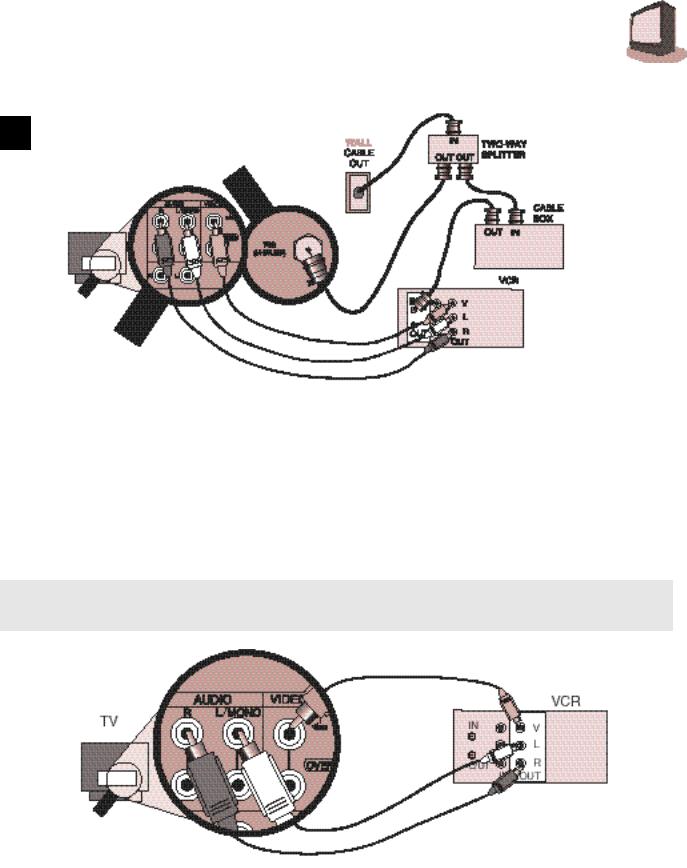
C O N N E C T I O N S 7
CABLE & VCR CONNECTIONS CONTINUED
#3
1)Connect
2)Connect RF Out from splitter RF output, in to cable box RF input.
3)Connect RF wire Out from cable box RF output, in to VCR RF input.
4)Connect RF wire Out from splitter RF output, in to TV VHF/UHF input.
5)Connect yellow video cable out from VCR Video output, in to TV Video input jack.
6)Connect white audio cable out from VCR Left audio output, in to TV Left Audio input jack.
7)Connect red audio cable out from VCR Right Audio output, in to TV Right Audio input jack.
If your VCR is mono it has only one audio out jack, connect it to TV L/Mono input.
AUDIO/VIDEO CONNECTIONS — STEREO
To get stereo sound from a hi-fi stereo VCR, you must connect it to the TV with Audio/Video cables. To get the best picture quality from any VCR, you should connect it to the TV with Audio/Video cables.
1)Yellow video cable out from VCR, in to TV Video input jack.
2)White audio cable out from VCR Left Audio output, in to TV Left Audio input jack.
3)Red audio cable out from VCR Right Audio output, in to TV Right Audio input jack.
NOTE: If your VCR is mono, it has only one audio out jack. Connect it to the TV L/Mono input.
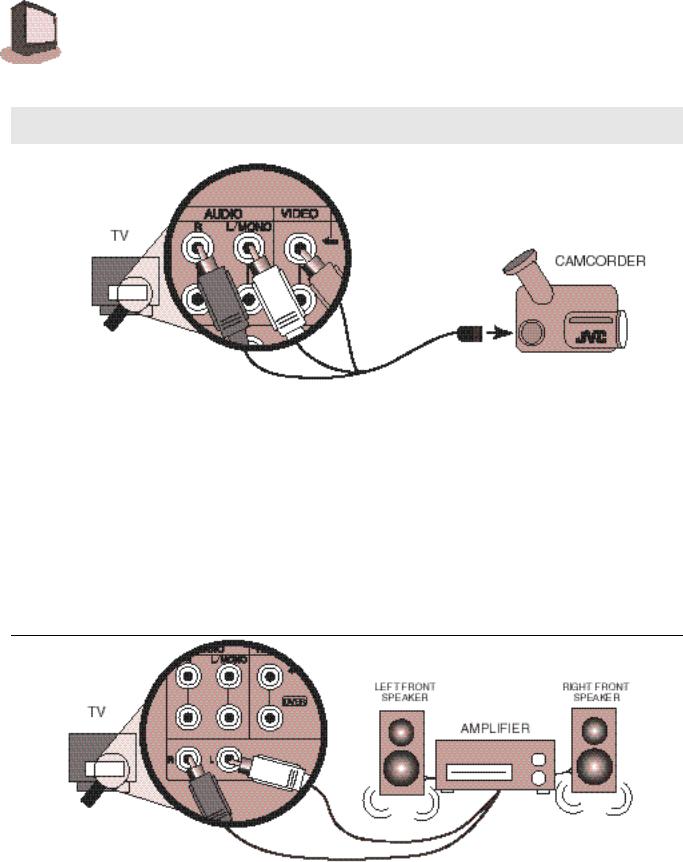
8 C O N N E C T I O N S
CONNECTING TO A CAMCORDER
Play your home movies back through your TV by connecting your camcorder to the TV’s A/V Inputs.
1)White audio cable out from camcorder, in to TV Left Audio input jack.
2)Yellow video cable out from camcorder, in to TV Video input jack.
3)If you have a stereo model camcorder, connect the Red Audio cable out from the camcorder, in to the TV Right Audio input jack.
TO CONNECT TO S-VHS ACCESSORIES:
Keep the audio connections the same as for a non-S-VHS VCR or camcorder (above), and use the special S-VHS cable that came with the VCR or Camcorder.
1) S-VHS Plug out from VCR, in to TV’s S-Video input.
CONNECTING TO AN EXTERNAL AMPLIFIER
1)White audio cable out from TV Left Audio output jack, in to Amplifier [Left] input.
2)Red audio cable out from TV Right Audio output jack, in to Amplifier [Right] input.
NOTE: A) Set the TV Speaker to OFF (page 21), switch the audio output to VARI (page21), and adjust the sound with the TV remote’s VOLUME button.
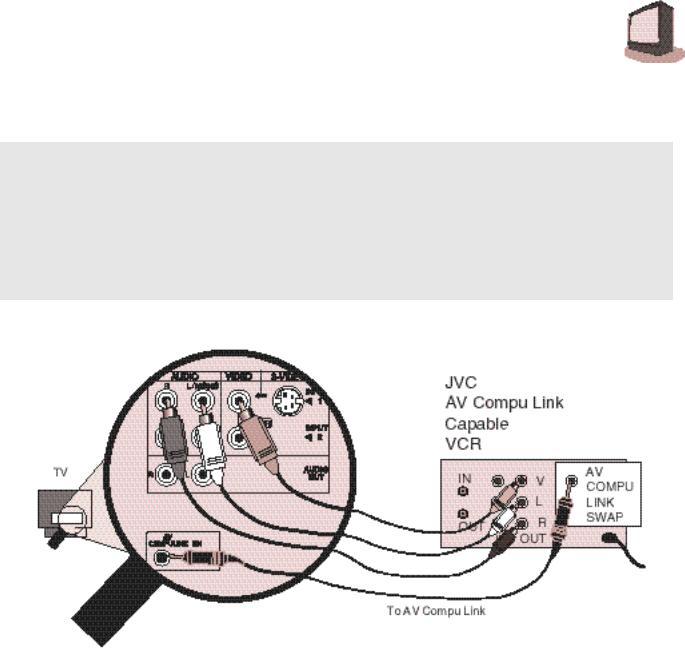
C O N N E C T I O N S 9
CONNECTING TO JVC AV COMPU LINK
CAPABLE COMPONENTS
AV Compu Link makes playing video tapes totally automatic. Simply insert a pre-recorded tape* into the JVC brand VCR, and the VCR automatically turns on and starts playing. At the same time, the VCR sends an AV Compu Link signal to the television telling it to turn on and switch to the correct video input.
NOTE: The AV Compu Link cable should be included with the AV Compu Link capable accessory you intend to connect. If it is not, contact an authorized JVC Service Center for Part # EWP 805-012.
NOTES:
A)The AV Compu Link cable has a male 3.5 mm (mono) mini plug on each end.
B)If your JVC brand VCR has A Code/B Code Remote Control Switching (see your VCR instructions), using VCR A Code will switch the TV to Video Input 1. If you use Input 1 for Video out from the cable box, use Input 2 here. Using B Code will switch the TV to Video Input 2.
C)To connect a JVC HiFi receiver or amplifier for a completely automated home theater, see the HiFi receiver's instructions for detailed hookup diagrams.
*In order for the VCR to start playback automatically, the recording tabs must be removed from the VHS tape. If the tab is in place, automatic switching starts when you push the VCR PLAY button.
**AV COMPULINK EX is compatible with the following 1998 receivers: RX-664V, RX-665V, RX-774V, RX-884V, RX-1024V, and later receiver models.
